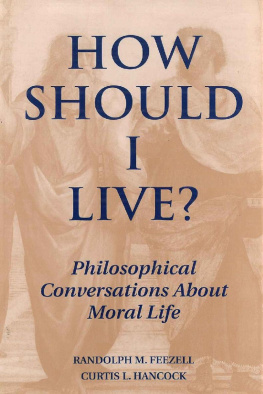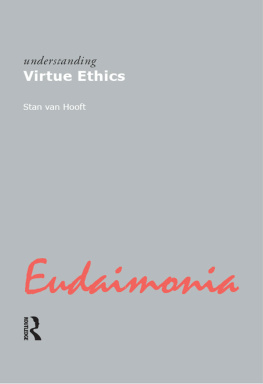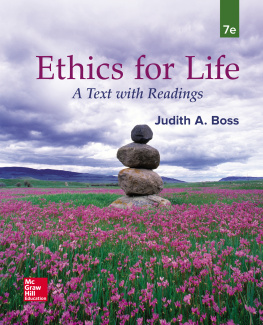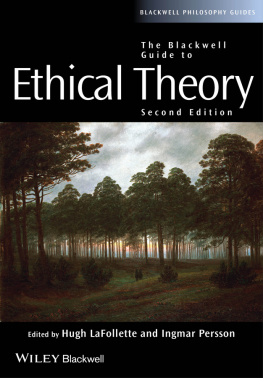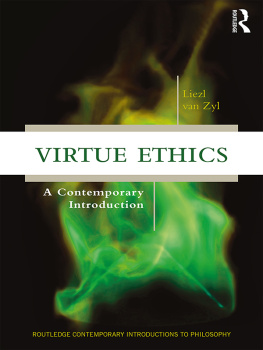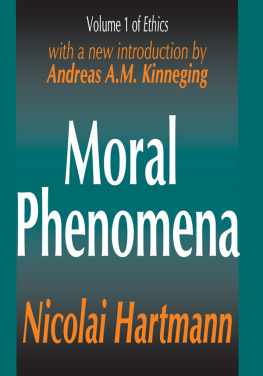
How Should
I Live ?
Philosophical Conversations about Moral Life
Randolph M. Feezell
CREIGHTON UNIVERSITY
Curtis L. Hancock
ROCKHURST COLLEGE

PARAGON HOUSE
St. Paul, Minnesota
First edition, 1991 Published in the United States by Paragon House 1925 Oakcrest Avenue, Suite 7 St. Paul, MN 55113 Copyright 1991 by Paragon House All rights reserved. No part of this book may be reproduced, in any form, without written permission from the publishers, unless by a reviewer who wishes to quote brief passages. Book Design by Deirdre C. Amthor Library of Congress Cataloging-in-Publication Data Feezell, Randolph M., 1950 How should I live?: philosophical conversations about moral life/ Randolph M. Feezell and Curtis L. Hancock.lst ed. p. cm. Includes bibliographical references. ISBN 1-55778-284-9: $14.95 1. Ethics. 1. Hancock, Curtis L., 1950 . II. Title. BJ1025.F26 1991 170dc20 90-20574 CIP e-book ISBN: 978-1-61083-074-4
Preface
In this book we have tried, like many ethics teachers before us, to provide an introduction to ethics. In most respects, our book is traditional. But we have decided to present the traditional and basic issues of ethics in a relatively nontraditional way. We have written a series of dialogues, philosophical conversations in which the participants engage in disputes about the basic principles and foundations of our moral lives.
FORM
We have presented the issues in dialogue form primarily for pedagogical reasons. Combined, we have taught ethics for over twenty-five years. We have become familiar with what students say and ask, course after course, semester after semester, year after year. The dialogue form offers a way to respond to student views in a more realistic and compelling manner than usual textbook presentations. We want to examine the issues in a way that is as clear, lively, and interesting as possible for students who will come to this book with little or no background in philosophy. Above all, we want the students to gain a sense of both the content of ethics and the process of philosophizing.
Philosophy isnt merely solitary reflection or scholarly devotion to the interpretation of significant historical texts. Philosophy isnt merely the possession of certain ideas or values, or the convictions that unify our different lives. Philosophy is active reflection, or, as Aristotle put it, a habitus of the intellect. It is, in an important sense, an activity of engagement, a pursuit, an inquiry that involves others who question, criticize, and challenge. The model, as always, is Platos works, especially the early Socratic dialogues. In these dialogues, philosophy is brought into relation with the concrete concerns of life. For Socrates, philosophy wasnt idle chatter or abstract reflection. For him, philosophy was essentially related to questions about how we ought to live and what we ought to pursue. Our dialogues surely fall short of the literary and philosophical richness of Platos; however, they are animated by commitments we share with him and others. We think philosophy is worthwhile, and we believe philosophical conversation is a great good. We also believe that the presentation of ideas in dialogue form can be uniquely instructive.
CONTENT
As we have indicated, many of the traditional issues of ethics are discussed in these dialogues. In the first dialogue, we attempt to give the student a sense of what ethics is about, and we raise questions concerning the extent to which ethics, or ethical reflection, is personal (or in some sense subjective), and impersonal, (or in some sense objective). In the second dialogue, we criticize the position that ethics is necessarily related to religion, or must be grounded in religious commitments. We criticize the so-called Divine Command Theory of morality, and we argue that ethical thinking is autonomous. The third dialogue offers fairly standard criticisms of both descriptive and normative relativism.
In the fourth, fifth, and sixth dialogues, we discuss, respectively, ethical egoism, utilitarianism, and Kants basic deontological perspective. We attempt to be fair in offering the central ideas of each theory and in examining why some people have thought each to be an inadequate or incomplete account of our moral lives. Here the reader may sense a gentle progression from less to more adequate theories, or at least a developing understanding of the thickness of our moral lives and what an adequate theory would have to account for if it claimed to be a complete or thorough picture of morality.
The seventh and eighth dialogues are somewhat more unconventional for an introductory ethics book. The seventh dialogue attempts to present a clear picture of the centrality of virtue in our moral lives. Many introductory ethics texts simply ignore the so-called ethics of virtue. This is regrettable, since such an omission neglects the entire natural law tradition, which dominated so much moral discourse in ancient and medieval times. Including a treatment of this important tradition makes our book distinctive.
The eighth dialogue is somewhat idiosyncratic for an introductory ethics book, but we think the topic deserves treatment. It is inspired by Carol Gilligans work on moral development, and it discusses her notion that females typically approach and reconstruct moral situations according to an ethic of care, as opposed to a justice perspective more typical of males. One can also interpret an ethic of care as a virtue ethic.
Finally, the epilogue furnishes a brief discussion of the value of ethics. This is an important topic since there is both uncertainty and disagreement, even among professional philosophers, about the nature and value of ethics as a discipline. There is even skepticism about the value of ethics courses.
We believe that each dialogue can stand alone, but we also hope that philosophy teachers will assign the chapters in order so the students will get to know each character and have a sense of progression in the dialogues.
PEDAGOGY
The quotations at the end of each chapter are meant to be clear expressions of the position critically discussed in the dialogue. The quotations are not meant to represent both sides of the debate. The criticisms of each position emerge as the dialogue progresses.
The questions at the end of each dialogue can be used for discussion. The student should read the questions carefully in order to focus on some of the main issues addressed in each dialogue and to guide further reflection on related issues. The teacher might also assign one of the suggested readings mentioned at the end of each dialogue.
The examples in the introductory chapter, To the Student, can be used to generate initial discussion and to help students gain a keener sense of their own presuppositions when they begin to think philosophically about the issues discussed in the dialogues. The questionnaire also serves to make explicit these assumptions.
We believe our text is both highly accessible and challenging, appropriate for use on a variety of levels of course work. We hope that teachers and students will find this to be an approachable and useful introduction to ethics. It could be used along with primary sources, or as a main text, or as a treatment of ethical theory in the first part of a course on applied ethics. We also believe it is clear and nontechnical enough to be assigned as recommended supplemental reading in many ethics courses.
ACKNOWLEDGMENTS
We want to thank the Center for Health Policy and Ethics and the Graduate School at Creighton University for supporting this project. Various people at Creighton provided stimulating conversation that was helpful in clarifying parts of the manuscript; among them, Charles Dougherty, Joseph Allegretti, and Beverly Kracher. We also want to thank Nanci Borg and Peggy Troy for their tireless efforts in producing the physical manuscript. We want to acknowledge two members of the Rockhurst College community for their help toward the completion of this project. Both Dr. Thomas J. Trebon, dean of Arts and Sciences, and Wilfred L. LaCroix, S. J., chairperson of the Department of Philosophy, provided released time and some financial support. Additionally, the reviewers of this book made suggestions that have improved its quality and readability. We are grateful for the encouragement and editorial insights we received from the people at Paragon House, including Don Fehr, Jo Glorie, and Peter Coveney.
Next page
